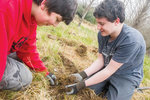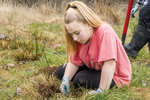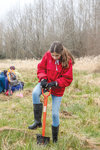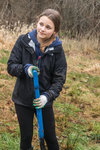



Hours before Gov. Jay Inslee announced that schools would be closed for six weeks to try and stop the spread of coronavirus, 60 students from Blue Heron Middle School were getting their hands dirty planting native trees and shrubs at Salmon Creek.
Rain, cold and mud could not keep the group of seventh-graders from enjoying themselves, digging holes and plotting out where they will plant native species to help the riparian habitat.
“I didn’t expect planting trees to be fun,” said seventh-grader Meg Hoffman. “But now that we’re actually doing it, it is fun. So that was a good surprise.”
This is the fourth year that the seventh-grade class from Blue Heron has participated in planting native plants and shrubs along creeksides in need of restoration.
The project is a three-field-trip extravaganza in partnership with the North Olympic Salmon Coalition and with grant funding from Ocean Guardian, a project of NOAA’s Office of National Marine Sanctuaries that offers opportunities for students to learn about their local watersheds. Seventh-grade teachers Jen Manning, Roger Mills, Jef Waibel and Brett Navin partner with educators from the North Olympic Salmon Coalition to show students the importance of healthy habitats.
Students visit sites that have been preserved, such as Jefferson Land Trust’s Illahee Reserve along Chimacum Creek. Then, they visit sites that need to be preserved to improve salmon habitat.
“Then we go back to the classroom and learn about trees, different native species, and the students make a plan for improving the habitat,” said teacher Jef Waibel.
Each group of students mapped out which trees, shrubs and bushes they would plant where—making sure to vary shrubs between trees so nothing would get overcrowded and die.
“We have to plant things four feet apart,” said seventh-grader Cadence Harland. “Right now, we’re digging the holes, and then we’re going to look at the map to see what to plant.”
Digging in the dirt, breathing in the fresh air and discussing loudly what should be planted where was the perfect distraction for the teenagers who might otherwise be occupied by the world news or impending homework and chores.
“It’s hard, but it’s very rewarding when you’re done,” Harland said. “I like to be around my friends. Also, it’s just nice to be outside.”
Getting out in the field also connects students to what they learn in the classroom, said Hannah Seligmann, the education program manager with the North Olympic Salmon Coalition.
A year from now, they can come back and see the growth of their plants.
“It’s important that we’re training the next generation of restoration practitioners,” Seligmann said.